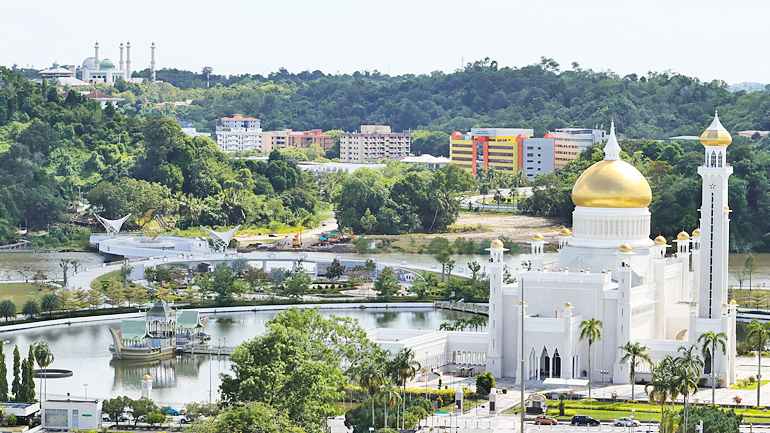State Mufti stresses the crucial role of a da’ie in spreading Islamic teachings.

Da’ie, or Islamic propagators, play a pivotal role in maintaining the dakwah, propagation of Islamic teachings, and spreading the message of Islam to the masses.
“Regarded as individuals who have been bestowed with the responsibility by Allah the Almighty to nurture the faith and utilise their approaches to convey the dakwah effectively, particularly in terms of their readiness and techniques, which are crucial components in assessing the efficacy of the dakwah process.”
These were the words expressed by State Mufti Pehin Datu Seri Maharaja Dato Paduka Seri Setia (Dr) Ustaz Haji Awang Abdul Aziz bin Juned in his premiere paper Empowering the quality of da’ie during a recent International Seminar on Usuluddin Education. He also mentioned that in the pursuit of bolstering the capabilities of da’ie, it becomes imperative for them to augment their proficiency, know-how, and understanding through a variety of methodologies.
Furthermore, given the context of our existence within Industrial Revolution 4.0, it is essential for them to embrace the utilisation of cutting-edge technological platforms. This integrated approach contributes to the enhancement of da’ie’s effectiveness in their mission.
The State Mufti observed that dakwah is more virtuous when the movement is being empowered by referring to three factors that contribute to its effectiveness, including the commands of Allah the Almighty, how dakwah is being conducted – which is by facilitating it with wisdom and good advice; and using a better approach and good preparation.
“Dakwah is a fundamental characteristic to promote goodness among humanity, and it serves as guidance and platform for the introduction to Islam.
“The work of disseminating dakwah and strengthening the eminence of Islam cannot be stopped, it needs to be carried out continuously, but at the same time, dakwah still needs to be empowered in order to achieve its goals and success.”
In the State Mufti’s opinion, the empowerment of dakwah can be realised through one of many ways, which is for a da’ie to polish and strengthen their methods of dakwah, along with their knowledge and skills.
He went on to say that they also need to enhance the three methods of dakwah – Dakwah Bil Lisan (verbal delivery through lectures), Dakwah Bil Kitabah (written dakwah), and Dakwah Bil Hal (action-oriented dakwah).
Focusing on Dakwah Bil Lisan, the State Mufti highlighted the importance of conveying the message verbally, emphasising that this form of dakwah centres on advocating virtuous practices and discouraging prohibited actions.
“Wisdom must be exercised in its execution to effectively engage the intended audience or recipients of the dakwah.” He emphasised that in the realm of Dakwah Bil Lisan, a da’ie should adeptly employ techniques that encompass the art of communication, using precise language selection as this proficiency applies whether they are delivering lectures, sermons or engaging through other platforms.
“Accomplishing this signifies the empowerment and success of the dakwah effort,” said the State Mufti.
He also stressed the crucial point that Dakwah Bil Lisan’s effectiveness is contingent upon the da’ie’s proficiency in mastering the subject matter or themes they aim to convey. Without the capability to possess sound knowledge or when the discourse lacks impact, the potential for failure or a lack of empowerment in the Dakwah Bil Lisan becomes evident.
In this regard, the State Mufti clarified that the acquisition of skills and expertise primarily stems from knowledge, particularly the teachings derived from Al-Quran and Hadith transmitted by Prophet Muhammad’s (pbuh) companions and their successors, alongside insights from Islamic scholars.
The pivotal aspect of enhancing the influence and effectiveness of their dakwah delivery hinges on the da’ie’s proficiency in judiciously selecting topics or themes. This is further amplified by aligning these choices with the prevailing circumstances and the specific requirements of their audience.
“Empowering the quality of da’ies, in reality, depends on the da’ies themselves. They are the propagators of dakwah. Continuous dakwah means the da’ies must continuously refine their dakwah.
“However, if they carry out dakwah once and then disappear for months, it means they are letting their dakwah wither and their qualities weaken. This needs to be overcome to empower da’ies and sharpen the dakwah.”
Reflecting on the significance of dakwah and counsel, the State Mufti concluded that careful consideration of the approach taken is essential to instil a compelling impact within people’s hearts and minds. – Rokiah Mahmud





